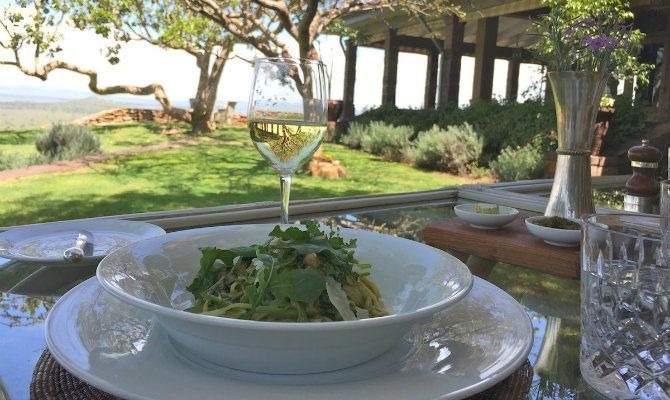Fine Dining In The Serengeti: A Q&A With Chef Kyle Ralph
Singita's Sasakwa Lodge in northern Tanzania is nearly 200 miles from the nearest city, so it's not exactly subject to culinary competition. But for Kyle Ralph, the head chef there, that's no reason to deliver anything less than five-star meals.
Here, in the heart of the 350,000-acre Grumeti Reserves, there are certainly more zebras and wildebeests than there are people, but those people are serious about dining. Ralph, a 28-year-old native of Durban, South Africa, and alum of the country's International Hotel School, oversees a team of about a dozen to prepare meals for his high-earning international clientele. He lives at the nearby staff village for three months at a time, taking a month off in between.
Before dinner one night, sitting on the Edwardian-style lodge's spectacular veranda overlooking the plains, Ralph and I spoke about the logistics of cooking in a remote area and the unique qualities of Tanzanian cuisine.[pullquote:left]
The Daily Meal: Is it challenging running a kitchen in the middle of the Serengeti?
Chef Kyle Ralph: Getting fresh produce in on a weekly basis is quite difficult. That's one of the reasons why we try to do our vegetables as local as possible. We've helped a group of farmers get started growing some of the basics — potatoes, rocket, tomatoes cabbage, celery — that we use in our cooking, and they sell it to us as well as other local communities. We've also recently started a garden on premises and we try to grow some stuff in there — rainbow carrots, kale — that we can't get elsewhere.
How can guests get a taste of Tanzanian cuisine at Sasakwa?
We have a Swahili tasting menu available if guests want to try it. They get ugali, a stiff porridge made from corn meal, which is like a polenta. They get wali, which is rice cooked in coconut mea. Goat is hugely popular in Tanzania, so I'll offer that. We also do a chicken stew, and then lots of local vegetables like mchicha, a local spinach, and sukuma wiki, a kind of kale. We also try to put local ingredients in our daily dishes.
Had you had much exposure to Tanzanian cuisine before you started working here?
No, it's just something I picked up. When I first got here, I got to taste all the local food. The people were so open and I got to experience whole new things. As a chef, that's important to me: Never diss it until you try it. If someone offers something to me, I'll always taste it. Tanzanian cuisine is a nice mix-up of all the different people that have come through it — Indians and Arabs for example.
What do you like about working at Singita?
Not many people can say they wake up to the plains of the Serengeti every morning, but I can. Some mornings I wake up to impalas barking at each other, or lions roaring, or hyenas laughing, or an elephant pulling up a tree outside my house. When I go to the city, I hate it because I'm stuck in traffic and I've got people hooting and all the fumes. If I'm stuck in traffic here, it's because the wildebeest migration is crossing the road. Those are once-in-lifetime things that I get to experience on a daily basis, which is quite amazing.
